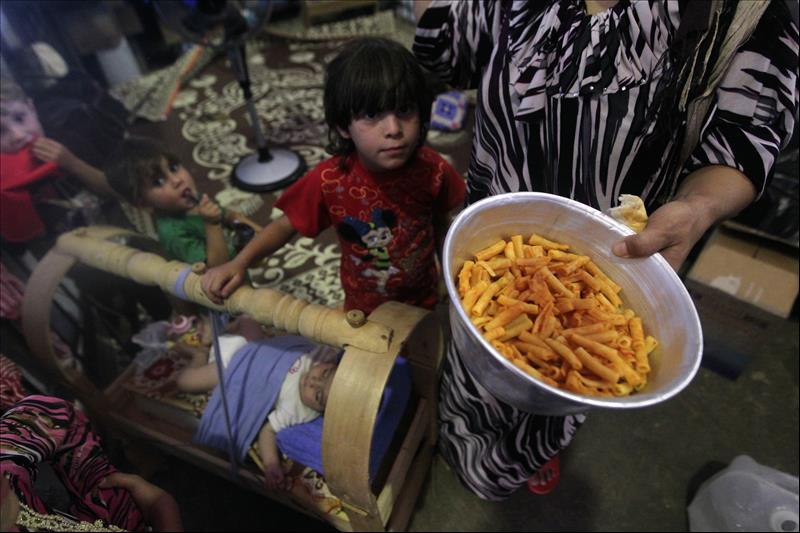
Crushing ISIS won't be enough to end the Sunni insurgency in Iraq
The question remains whether crushing ISIS can end the decade-long Sunni insurgency. The obvious answer is that it can't. A new report by a Washington, DC-based public policy group shows that a new Sunni insurgency is taking root in Iraq even as the US-led coalition continues to weaken ISIS strongholds, particularly in Mosul. The report by the Institute for the Study of War warned that al-Qaeda's leadership likely will capitalize on ISIS's continued losses and attempt to gain influence within splinter militant groups opposed to the Shia-led Iraqi government. Al-Qaeda has remained active in Iraq despite being overshadowed by ISIS. Al-Qaeda leader Ayman al-Zawahiri last August urged its Syrian branch to rebuild alliances in Iraq and resume a "long guerrilla warfare." http://gty.im/477483220
Jaysh Rijal al-Tariqa al-Naqshbandia (JRTN), a neo-Baathist insurgent group, harnessed the 2013 protest movement and is preparing to stoke its own full-fledged insurgency. JRTN earlier infused the anti-government protest movement with revolutionary rhetoric and traditional Baathist branding. It is evident that an environment is emerging that will allow for another Sunni insurgency in the vacuum left by ISIS. So, just by defeating one group, the Sunni insurgency can't be ended. The
The DailyBrief Must-reads from across Asia - directly to your inboxGrassroot problems which fan insurgency have to be addressed to achieve long-term solutions. Sectarian tensions between Sunnis and Shias are not new in Iraq, but in last decade Sunnis have been marginalized in the country. Iraqi Sunnis are disillusioned by the concentration of power by the Shia elite. Sunnis fear they risk becoming a dispossessed underclass in lands they once ruled before the Shia took over in 2004. A Sunni politician in Baghdad said his people are like abused children. 'We're the orphans of Iraq.'
Iraqi Sunnis say they are subject to extrajudicial execution, kidnapping, and destruction of homes and property. An Amnesty International report says thousands remain detained without trial on suspicion of links to ISIS. Torture is rife. Courts have sentenced terrorism suspects to death, frequently after unfair trials. Executions continue. Sunni heartlands are mostly on the frontline or in areas under ISIS control, while hostility from Shias, Kurds, and others make it difficult for Sunnis to establish new lives.
Numbers are uncertain, but a rough estimate indicates that of Iraq's perhaps seven million Sunni Arabs, some 2.5 million are displaced, many of them in Iraqi Kurdistan where they have to renew permits every four months. Some 1.5 million have left Iraq altogether. In the name of fighting terror, Kurdish and Shia militias chased Sunnis off their lands, first in southern and northern Iraq and then in the center of the country. Checkpoints put Sunnis under siege and prevent a mass Sunni return.
The outcome will be disastrous if nothing is done to help the Sunnis address grievances. Increased sectarian tensions will help insurgents capitalize on worsening conditions. Sectarian warfare must be ended in order to shift the political focus away from questions of state legitimacy and toward efficiency, corruption, and service delivery. Successful resettlement and reconstruction efforts that earn the Sunni population's trust in the government can prevent Salafi Jihadi groups from finding fertile ground.
The US should also help address the issues that fuelled the Sunni insurgency and remain active in shaping political reconciliation efforts and encouraging inclusive governance. The US should expect to remain involved in Iraq to ensure that anti-ISIS gains stick and that conditions that allowed insurgent groups to emerge in 2013 are resolved. Every stakeholder agrees that Iraq needs a modern democratic state founded on the basis of equal citizenship for all. Without a durable post-ISIS strategy of national integration, the country will fall into even greater chaos.
Share Tweet Linkedin Email Al Qaeda ISIS Sunni Ayman al-Zawahiri Shia Kurds Manish Rai Manish Rai is a columnist for Middle-East and the Af-Pak region, and Editor of geo-political news agency ViewsAround. He can be reached at .
Legal Disclaimer:
MENAFN provides the
information “as is” without warranty of any kind. We do not accept
any responsibility or liability for the accuracy, content, images,
videos, licenses, completeness, legality, or reliability of the information
contained in this article. If you have any complaints or copyright
issues related to this article, kindly contact the provider above.


















Comments
No comment